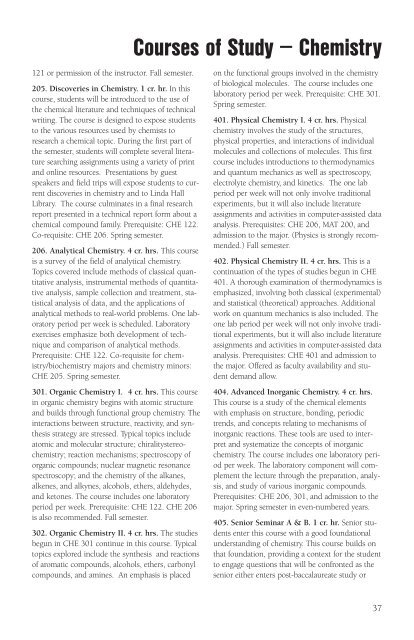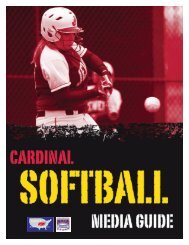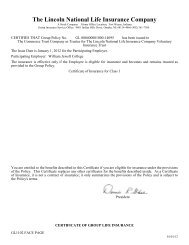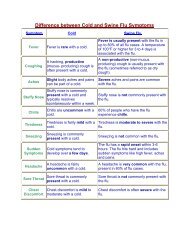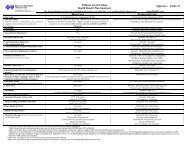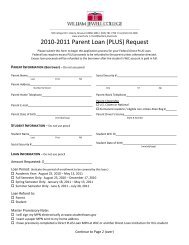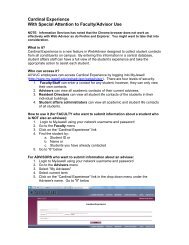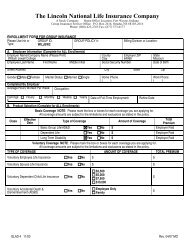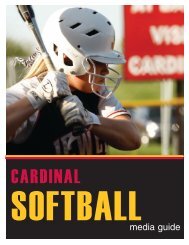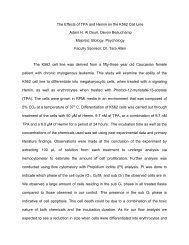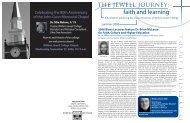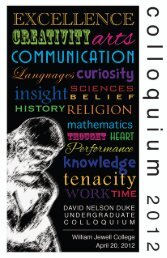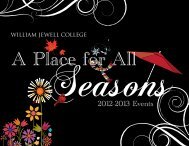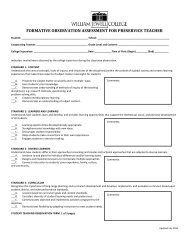Courses of Study - William Jewell College
Courses of Study - William Jewell College
Courses of Study - William Jewell College
You also want an ePaper? Increase the reach of your titles
YUMPU automatically turns print PDFs into web optimized ePapers that Google loves.
121 or permission <strong>of</strong> the instructor. Fall semester.<br />
205. Discoveries in Chemistry. 1 cr. hr. In this<br />
course, students will be introduced to the use <strong>of</strong><br />
the chemical literature and techniques <strong>of</strong> technical<br />
writing. The course is designed to expose students<br />
to the various resources used by chemists to<br />
research a chemical topic. During the first part <strong>of</strong><br />
the semester, students will complete several literature<br />
searching assignments using a variety <strong>of</strong> print<br />
and online resources. Presentations by guest<br />
speakers and field trips will expose students to current<br />
discoveries in chemistry and to Linda Hall<br />
Library. The course culminates in a final research<br />
report presented in a technical report form about a<br />
chemical compound family. Prerequisite: CHE 122.<br />
Co-requisite: CHE 206. Spring semester.<br />
206. Analytical Chemistry. 4 cr. hrs. This course<br />
is a survey <strong>of</strong> the field <strong>of</strong> analytical chemistry.<br />
Topics covered include methods <strong>of</strong> classical quantitative<br />
analysis, instrumental methods <strong>of</strong> quantitative<br />
analysis, sample collection and treatment, statistical<br />
analysis <strong>of</strong> data, and the applications <strong>of</strong><br />
analytical methods to real-world problems. One laboratory<br />
period per week is scheduled. Laboratory<br />
exercises emphasize both development <strong>of</strong> technique<br />
and comparison <strong>of</strong> analytical methods.<br />
Prerequisite: CHE 122. Co-requisite for chemistry/biochemistry<br />
majors and chemistry minors:<br />
CHE 205. Spring semester.<br />
301. Organic Chemistry I. 4 cr. hrs. This course<br />
in organic chemistry begins with atomic structure<br />
and builds through functional group chemistry. The<br />
interactions between structure, reactivity, and synthesis<br />
strategy are stressed. Typical topics include<br />
atomic and molecular structure; chiralitystereochemistry;<br />
reaction mechanisms; spectroscopy <strong>of</strong><br />
organic compounds; nuclear magnetic resonance<br />
spectroscopy; and the chemistry <strong>of</strong> the alkanes,<br />
alkenes, and alkynes, alcohols, ethers, aldehydes,<br />
and ketones. The course includes one laboratory<br />
period per week. Prerequisite: CHE 122. CHE 206<br />
is also recommended. Fall semester.<br />
302. Organic Chemistry II. 4 cr. hrs. The studies<br />
begun in CHE 301 continue in this course. Typical<br />
topics explored include the synthesis and reactions<br />
<strong>of</strong> aromatic compounds, alcohols, ethers, carbonyl<br />
compounds, and amines. An emphasis is placed<br />
<strong>Courses</strong> <strong>of</strong> <strong>Study</strong> – Chemistry<br />
on the functional groups involved in the chemistry<br />
<strong>of</strong> biological molecules. The course includes one<br />
laboratory period per week. Prerequisite: CHE 301.<br />
Spring semester.<br />
401. Physical Chemistry I. 4 cr. hrs. Physical<br />
chemistry involves the study <strong>of</strong> the structures,<br />
physical properties, and interactions <strong>of</strong> individual<br />
molecules and collections <strong>of</strong> molecules. This first<br />
course includes introductions to thermodynamics<br />
and quantum mechanics as well as spectroscopy,<br />
electrolyte chemistry, and kinetics. The one lab<br />
period per week will not only involve traditional<br />
experiments, but it will also include literature<br />
assignments and activities in computer-assisted data<br />
analysis. Prerequisites: CHE 206, MAT 200, and<br />
admission to the major. (Physics is strongly recommended.)<br />
Fall semester.<br />
402. Physical Chemistry II. 4 cr. hrs. This is a<br />
continuation <strong>of</strong> the types <strong>of</strong> studies begun in CHE<br />
401. A thorough examination <strong>of</strong> thermodynamics is<br />
emphasized, involving both classical (experimental)<br />
and statistical (theoretical) approaches. Additional<br />
work on quantum mechanics is also included. The<br />
one lab period per week will not only involve traditional<br />
experiments, but it will also include literature<br />
assignments and activities in computer-assisted data<br />
analysis. Prerequisites: CHE 401 and admission to<br />
the major. Offered as faculty availability and student<br />
demand allow.<br />
404. Advanced Inorganic Chemistry. 4 cr. hrs.<br />
This course is a study <strong>of</strong> the chemical elements<br />
with emphasis on structure, bonding, periodic<br />
trends, and concepts relating to mechanisms <strong>of</strong><br />
inorganic reactions. These tools are used to interpret<br />
and systematize the concepts <strong>of</strong> inorganic<br />
chemistry. The course includes one laboratory period<br />
per week. The laboratory component will complement<br />
the lecture through the preparation, analysis,<br />
and study <strong>of</strong> various inorganic compounds.<br />
Prerequisites: CHE 206, 301, and admission to the<br />
major. Spring semester in even-numbered years.<br />
405. Senior Seminar A & B. 1 cr. hr. Senior students<br />
enter this course with a good foundational<br />
understanding <strong>of</strong> chemistry. This course builds on<br />
that foundation, providing a context for the student<br />
to engage questions that will be confronted as the<br />
senior either enters post-baccalaureate study or<br />
37


